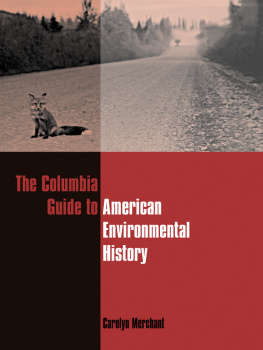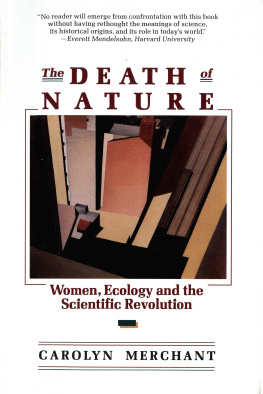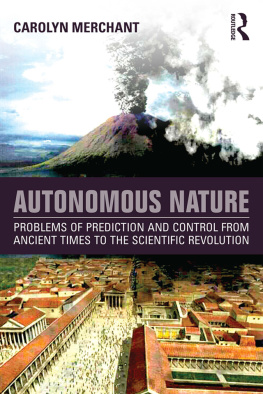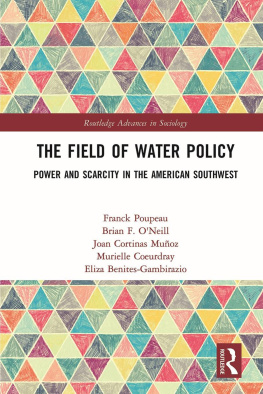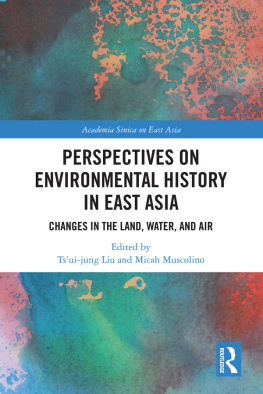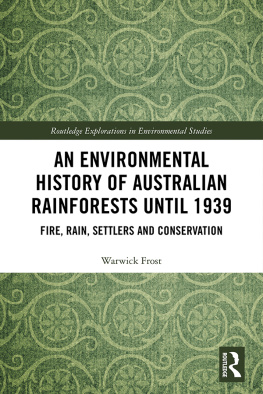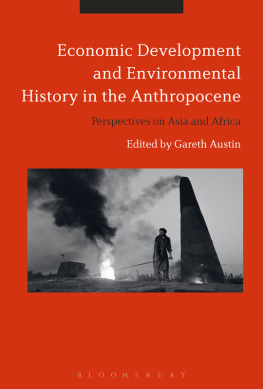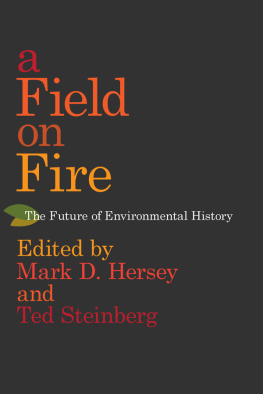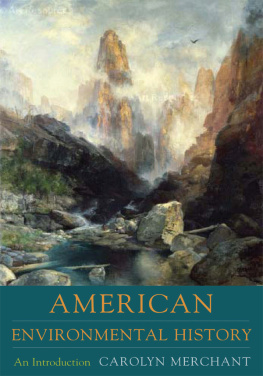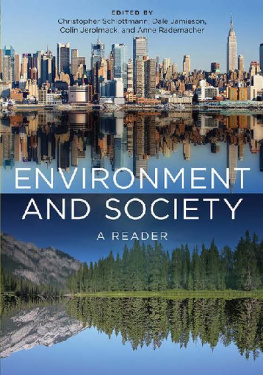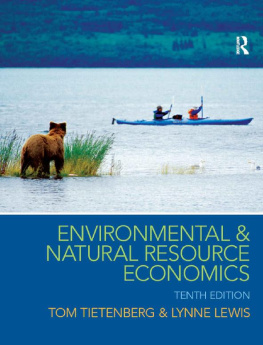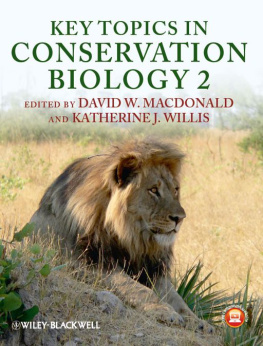The Columbia Guide to American Environmental History
The Columbia Guides to American History and Cultures
The Columbia Guides to American History and Cultures
The Columbia Guide to the Cold War
Michael Kort
The Columbia Guide to American Women in the Nineteenth Century
Catherine Clinton and Christine Lunardini
The Columbia Guide to America in the 1960s
David Farber and Beth Bailey
The Columbia Guide to Asian American History
Gary Y. Okihiro
The Columbia Guide to American Environmental History
Carolyn Merchant
COLUMBIA UNIVERSITY PRESS NEW YORK
COLUMBIA UNIVERSITY PRESS
Publishers Since 1893
New York Chichester, West Sussex
cup.columbia.edu
Copyright 2002 Columbia University Press
All rights reserved
E-ISBN 978-0-231-50584-0
Library of Congress Cataloging-in-Publication Data
Merchant, Carolyn.
The Columbia guide to American environmental history / Carolyn Merchant.
p. cm.
Includes bibliographical references and index.
ISBN: 0231112327 (cloth : alk. paper)
1. Human ecologyUnited StatesHistory.
2. NatureEffect of human beings onUnited StatesHistory.
3. Landscape changesUnited StatesHistory.
4. United StatesEnvironmental conditions.
Series: The Columbia guides to American history and cultures.
GF501 .M47 2002
304.2 21
2001-056192
A Columbia University Press E-book.
CUP would be pleased to hear about your reading experience with this e-book at .
Notice: Citations to World Wide Web pages (URLs) were accurate at the time of writing. Neither the author nor Columbia University Press is responsible for URLs that may have expired or changed.
Contents
Writing the Columbia Guide to American Environmental History has afforded me the unique opportunity to review and synthesize developments and resources in this relatively new and dynamic field. Environmental history emerged out of 1960s concerns over the impacts of pesticides, population, urbanization, and technologies on the environment. Propelled by popular interest in the state of the environment following Earth Day 1970, many people began rethinking the relationships between the environment and academic fields such as history, ethics, political science, and economics. The American Society for Environmental History was founded in 1977, a year after the journal Environmental Review (subsequently called Environmental History Review), which merged with Forest History in 1996 to become the journal Environmental History. A second journal published in England, entitled Environment and History, was launched in 1995. As the field has continued to grow, articles pertaining to the history of the environment have appeared in many journals and magazines. The Columbia Guide to Environmental History presents a survey of the field that includes an overview of topics and themes, a compendium of persons, concepts, and laws, a chronology of major historical events, and a guide to additional resources. No book of this type can ever be complete in light of the many topics and resources that continue to emerge in the environmental history field, and difficult decisions have led to what is included in this volume.
Although the final product published here is my own, I would like to thank the many persons who have made substantial contributions to the outcome. I owe much to the inspiration and careful guidance of my editor, James Warren of Columbia University Press, editor in chief of the Columbia Guide series, and to Joshua Lupkin, Nickolas Frankovich, and Leslie Bialler for editorial assistance.
The final draft of the book was prepared at the National Humanities Center and I am grateful to the John D. and Catherine T. MacArthur Foundation for supporting my work there as a fellow in the ecological humanities. Jessica Teisch compiled the bibliography, incorporating materials she had prepared for the National Humanities Center with funding from the National Endowment for the Humanities. Under a grant from the Committee on Research of the University of California at Berkeley, Alison Lozner compiled materials for the topical compendium, bibliographical essay, and the visual and electronic resources sections. Valerie Peters and Joshua Volz contributed many of the details in the chronology and William Yaryan, Earth Trattner, and Yvan Chantery assisted with materials included in the historical overview of topics and themes and in the sections devoted to visual and electronic resources. Celeste Newbrough prepared the index with funding from the University of California at Berkeleys Committee on Research.
I would like to thank Shepard Krech III and Timothy Silver, colleagues for three different summers in the Nature Transformed seminar at the National Humanities Center, for their ideas, careful reading, and many suggestions for the historical narrative. I would also like to thank my students and teaching assistants in my course American Environmental and Cultural History, taught since 1979, for their ideas and contributions to the intellectual content and methodology of the course and the field. I am indebted to my partner and husband, Charles Sellers, whose inspiration and intellectual contributions over many years have played a major role in my interpretation of American history and to whom I am deeply grateful for reading, editing, crafting, and rethinking portions of the historical narrative. Final responsibility for the content of the book is, of course, my own.
CM
Berkeley, California
The Columbia Guide to American Environmental History introduces the many dimensions of human interaction with nature over time. As people have lived and spread out over the planet, they have modified its forests, plains, and deserts. Those changes in turn have affected the ways in which people organize their social and religious systems. The Guide offers the reader a brief history of that interaction as it took place in North America; a mini-encyclopedia of concepts, laws, agencies, and people pertinent to the field; a timeline of important events; and a set of print, visual, and electronic resources for further reading and research.
Environmental history is both one of the oldest and newest fields within human history. All cultures have oral and written traditions that explain human origins and encounters with the natural world through stories about local landscapes and ways to perpetuate life from the land. Many cultures developed these early ideas into elaborate oral and written traditions, and finally into modern scientific approaches to explaining and managing the vicissitudes of nature. Religion, science, art, and literature provided ideas as they evolved over time, while records such as calendars, diaries, account books, treatises, and museum collections give access to human practices that modified the landscape.
Environmental history comprises a set of approaches to doing history that brings nature into the story. Natural conditions such as climate, rainfall, terrain, vegetation, and animal life create possibilities for the quality of human life. Human systems of producing and reproducing life over time entail technologies, economies, governance, and social structures. Such systems include gathering, hunting, and fishing; agriculture; and industrialization. These human systems, however, result in a transformed nature, and the character of that transformation is a major theme for environmental history. And, as nature changes, peoples ideas of what it ought to look like also change. For some a vanishing wilderness has positive value; for others it is a tragic loss. The character of such evolving ideas and how to implement or reverse landscape changes is another major topic for environmental historians.

